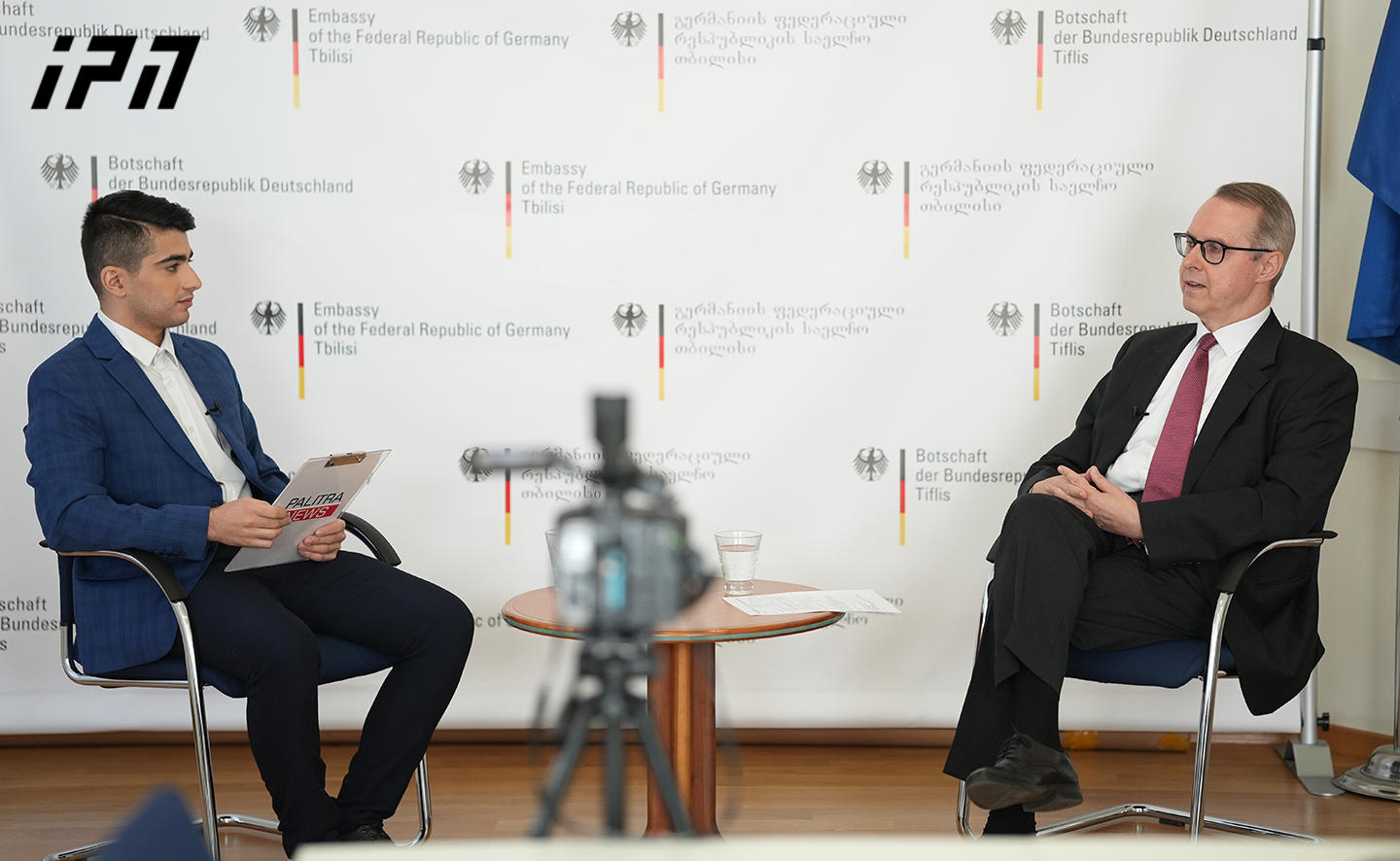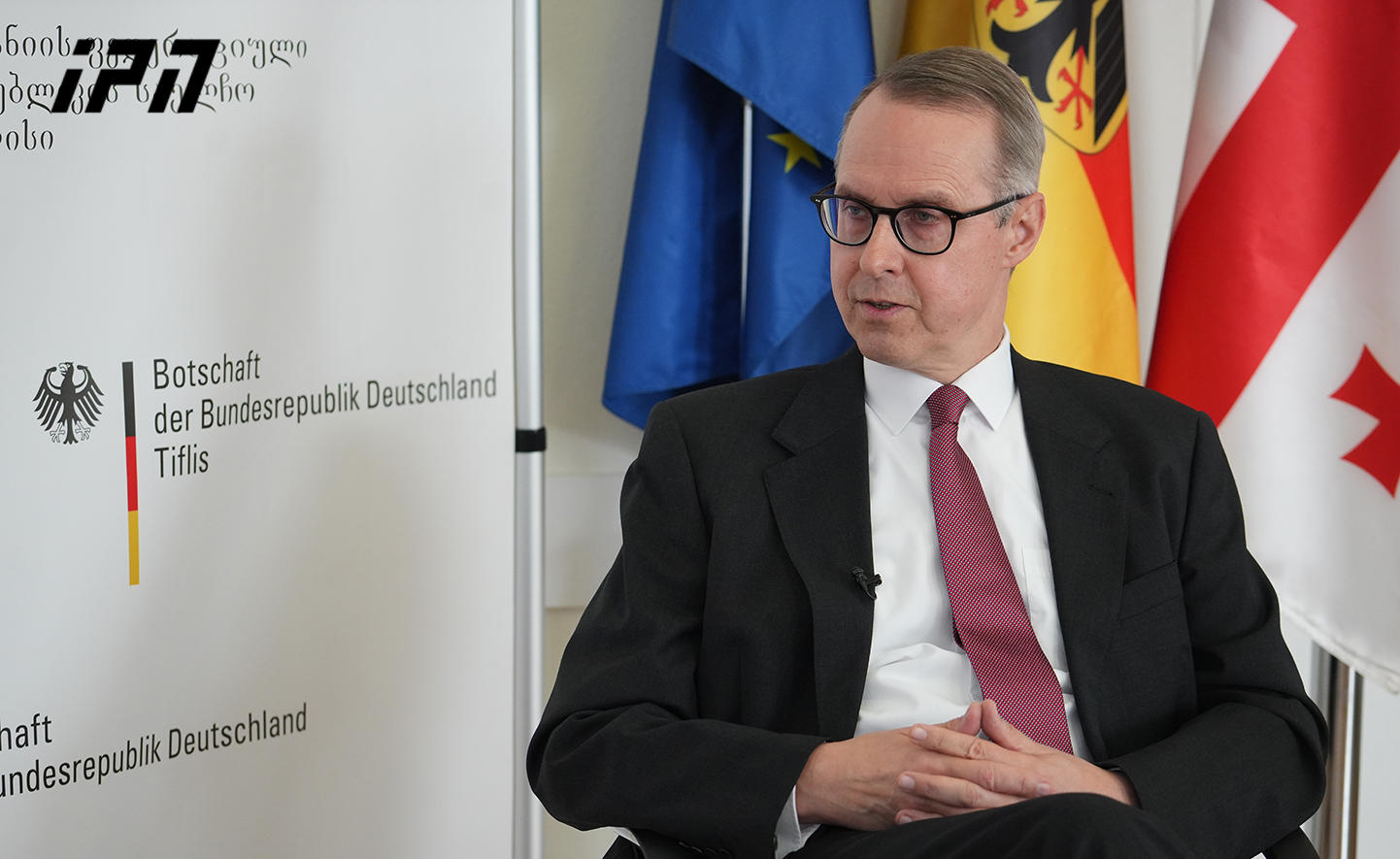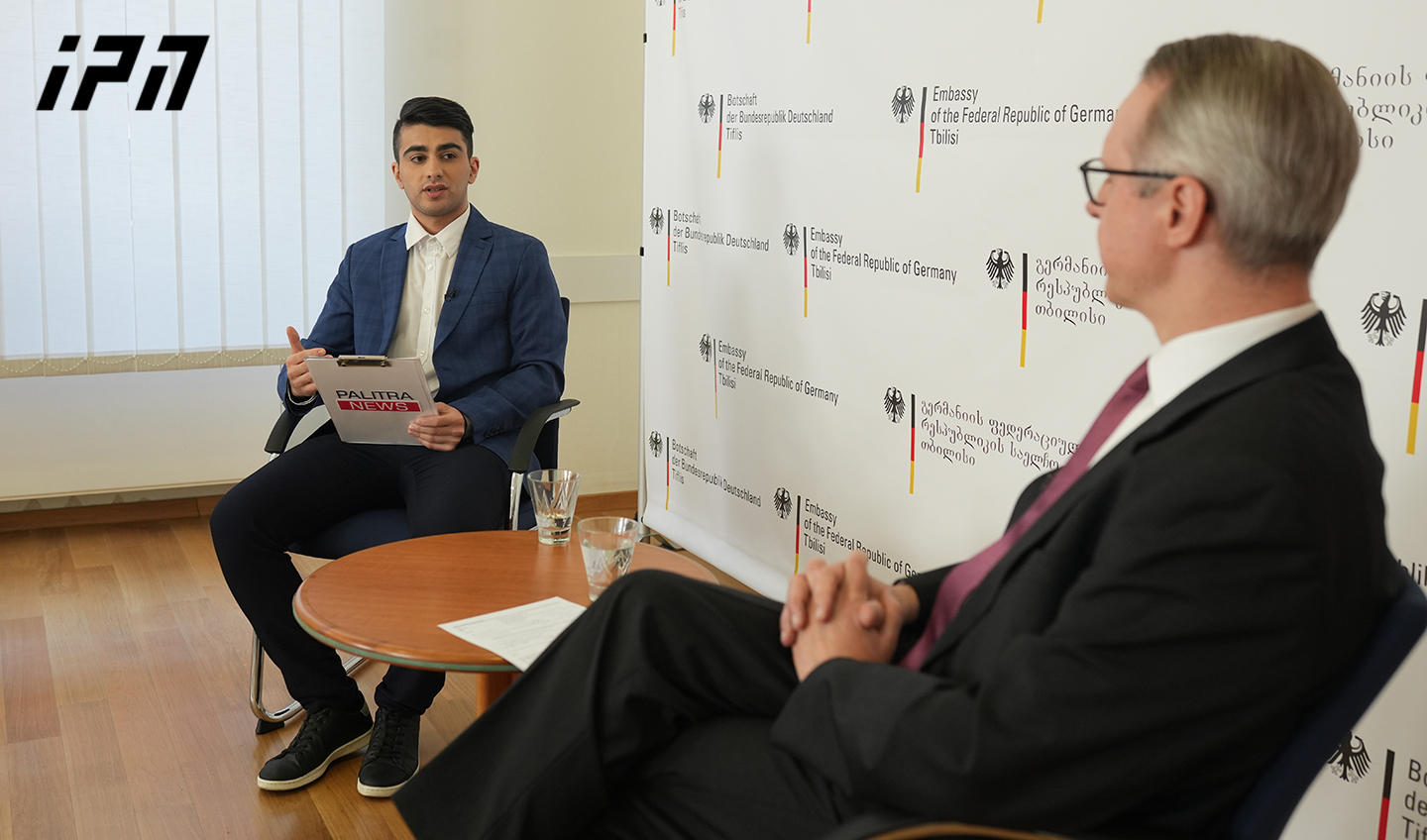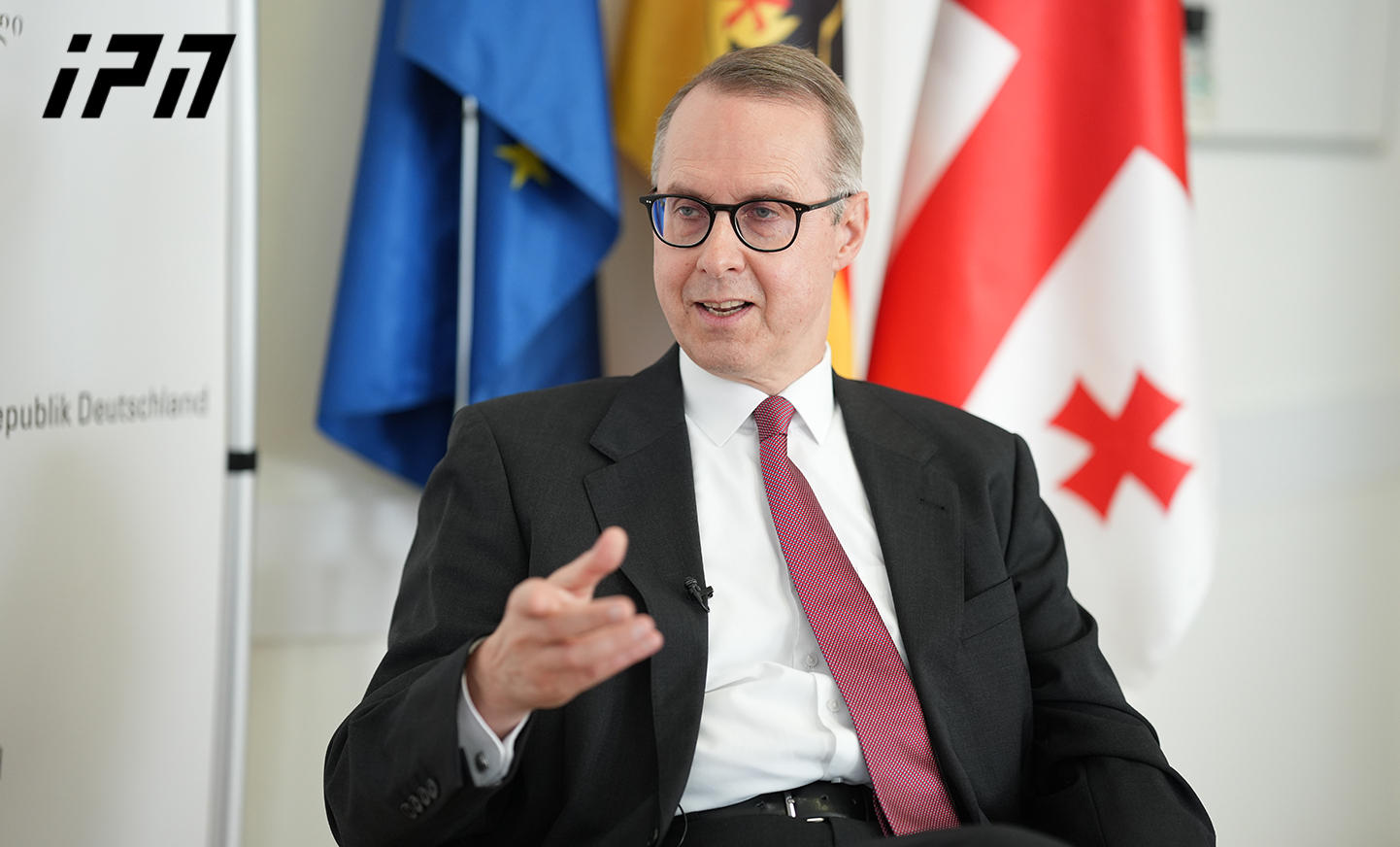
I can say for Germany, we want to say "yes". We want to enlarge the Union because the European Union is our protection against a world full of risks, Peter Fischer, the German Ambassador to Georgia, said in an exclusive interview with InterPressNews.
According to the German Ambassador, Georgia has made excellent progress, but more needs to be done on the way to accession, especially in terms of democracy and the rule of law.
What should the Georgian government and the opposition do to get the candidate status and what are their expectations in Berlin before the announcement of the final decision of the European Council - German Ambassador to Georgia Peter Fischer discussed these and other issues with IPN.
Let me start the interview with the most important issue for Georgia. The European Commission issued the recommendation for the European Council to grant Georgia the European Union membership candidate status. This is a historic moment for our country. The President of the Commission, Ursula von der Leyen said that there are number of steps to be taken by the Georgian authority. Also, the European Commission published the enlargement report. How would you evaluate the decision of the European Commission?
It was a historic day, and I would like to say a really big “gilotsavt” to all of Georgia, to all of the Georgian people, to everyone who has contributed to this very important recommendation. The Commission gives a recommendation, and this is something that is for orientation of the European Council. The European Council consists of 27 heads of state and government. So for Germany, Chancellor Scholz, for France President Macron, and so on. They will meet in the middle of December and they will make the decision about granting candidate status. But if the Commission recommends, that's a very good sign.

I can say for Germany, we want to say "yes". We want to enlarge the Union because the European Union is our protection against a world full of risks. Geopolitical risks: We've seen the aggression of Russia against Ukraine, but potentially also against other countries. We see violence in the Middle East. We see a lot of big challenges for the international community. We also see challenges to our way of living, which is in freedom, where the citizens have freedom rights, where we enjoy democracy, where we live by the rule of law, not by the rule of force. The European Union protects us from all that. The more countries are with us, the better this protection is.
At the same time, those countries that will join will also have this protection. We are there to protect each other.
So it is a historic day. It's important to keep in mind that the decision will only be in December. But I am very optimistic. The Commission also named nine areas where Georgia should continue working. And it's very important that Georgia does continue working, moving towards Europe, and until December does not send any opposite signals to us. The signal has to be, yes, we will continue working. The signal should not be that we are going backwards in any of the nine mentioned areas. And I said that the EU is our protection, but also the protection for our way of life, freedom, democracy, rule of law. And since it's our protection, and since there is a challenge to those values coming from the world, from a number of states that think it's better to rule from above and just give command, and the people should do what the rulers say, rather than letting the people decide and telling the government what to do:
We will not give any discount to any potential new members, especially in the area of democracy and rule of law institutions. That's a very important issue for us. We have the recommendation. In December, we will have a decision. I'm optimistic and I would like it to be yes. Germany would like it to be yes. The next step will be to open negotiations. Then we have 220,000 pages of legal text, the so-called Acquis, which means the full body of European legislation and standards which new members have to adopt. The first negotiating chapter to be opened and the last to be closed are always the two chapters on democracy and rule of law institutions. So that's a very fundamental point and it's really worth it to emphasize that.
What is your advice to the Georgian authority, what are the key issues that they have to strengthen working on? And what would you recommend to the opposition parties of Georgia for the best interests of the country?
So my advice is not my advice. It's the advice that's written in EU decisions and legislation. How to be a member of the European Union is not a mystery. Everything is available in black on white. One can read it. I encourage citizens of Georgia - perhaps not to read the 220,000 pages of the Aqcuis - but to read the Copenhagen Criteria. Those are three brief paragraphs, and to read what the Commission said yesterday. What they said is that we expect and hope that Georgia will continue advancing as it has advanced. That's why the recommendation was positive. Georgia has made so much excellent progress. But more is needed on the path to membership, especially on this area of democracy and rule of law institutions. I would say very clearly, the elections in 2024 in Georgia have to be free and fair and transparent, and there should be no doubt about it. The European Union will not accept a new member state where elections are not above any doubt.

What the Commission wrote in its recommendation can be summarized in nine points. We want to be sure Georgia has independent and non-partisan institutions. That means a number of institutions like the Anti-Corruption Bureau, Election Commission, National Bank of Georgia, Data Protection Service and others. All these institutions that are very important for a pluralistic democracy have to be independent and non-partisan.
Then of course to continue on your work on deoligarchization. There's a Georgian plan that's been submitted to the EU and there were some comments. Continue with that work. That's also a recommendation given to Ukraine and Moldova.
I would say a basis for all that, and you asked me about what's my recommendation to the government and to the opposition, a basis for all that is this famous depolarization. In a European Union style democracy, the political parties and civil society are called upon to work together in a constructive way. The first step is to accept the other side as legitimate. If the political discourse exhausts itself in saying, you're not legitimate, you should disappear, then there's no way you can have a constructive discussion. And I'm a big fan of the saying about democracy: "The hard thing in democracy is not to be right. The hard thing is to make a compromise." Because in society there are different opinions, different ideas. And in democracy, the art is to find a compromise, to build a majority and to make laws by majority vote that satisfy the people and protect the minorities. So this depolarization remains a challenge for Georgia. But all that being said, Georgia made enormous progress. Georgia got a positive recommendation.
I'm optimistic that the decision in December will be positive. Plus, the European Union works with Georgia, works with candidate countries to reach all those goals- together. So let's move forward together on this.
In December 2023, the European Council will make the final decision on granting Georgia candidate status. Now the heads of the EU states are going to vote for the decision. What are your expectations and as the representative of Germany, should we expect that the government of Olaf Scholz will vote in favor of Georgia?
My expectation is optimistic. The Commission recommendation gives our heads of state and government orientation. Germany wants to say yes, but like I said, we don't want to admit a new problem into the European Union. So if Georgia, as I expect, will continue on its reform path, continue strengthening democracy and rule of law institutions, then I'm quite optimistic that there will be a yes from the 27 heads of state and government. And Germany is in favor. Chancellor Scholz has said we have decided in favor of the big European Union.

Russia's unprovoked and unjustified full-scale invasion and war of Ukraine is still going on. Unfortunately, despite the strict sanctions and international isolation, Russia still manages to continue its aggression on Ukrainian soil. Also, we see that not all the European countries are willing to continue supporting Ukraine as they did before. Do you think that the EU countries will manage to maintain a strong, common position toward the Russian-Ukrainian war if the conflict lasts longer, and is the EU ready for such challenges?
Yes, I think so. Germany is committed to it. The great majority of EU countries are committed to it. We reject the illegal aggression against Ukraine. It runs against the very principles of how we think we should live together internationally. And the first rule of international relations is no wars of aggression, no change of borders by force. Why do we have the European Union? Because in the 19th and 20th century and before, we had a history of wars and violence in Europe. So the first principle of the EU is peaceful co-existence, respect for international borders and respect for international law. Of course, in the EU there's a diversity of opinions. What is the best way? There's a diversity of history and traditions and relations with Russia. That's normal in a democratic organization like the European Union. But I would repeat that the great majority is very firm. And it's not just the European Union. We have a great alliance with the United States of America. We are in other formats like the G7, where we have the UK, Japan and Canada as well. We are committed to supporting Ukraine as long as it takes. We are trying to limit this war, not expand it, limit it, but to bring peace to Ukraine and to maintain the territorial integrity and the sovereignty of Ukraine. In this case, this also means victory for Ukraine.
2024 is going to be an important year for the European Union, as the elections of the European Parliament will be held in June of the next year. How would you evaluate the political situation in the EU countries, where the popularity of right-wing and Eurosceptic political parties is rising? Do you see any threats for the major foreign, domestic or migration policy changes of the EU after the elections?
It's a good question, but also a hypothetical one. We don't know if they will win more votes. I can say that I hope they don't make any additional gains. We Germans have a history with the far-right. We were ruled by the Nazis. We committed the most horrible crimes in that time. And we should really know better. The way of intolerance is not the right way. It's the wrong way, and it can lead to a catastrophe. It brings us to the point of populism. And unfortunately, populism is gaining strength in many, many countries. And I think what the populist political forces do is, they promise simple solutions. They say, vote for us, and we have a few recipes, and everything will be okay. Normally, what's happened in Germany is that the populists from the far-right and the far-left, they developed in waves. They came up, and then when they got into parliaments, people realized that their solutions don't work. And so then the support went down again. I would hope that that will happen.

However, because we live in an age with many challenges and risks, we have more wars, we have all the sustainability and climate change issues, we have a globalization where everything is interconnected, which challenges the mindset of people who were used to living in their place, in their region, according to their tradition, with their religion, and so on. All of a sudden, they're living with strangers. It's only natural that they sometimes have difficulty in dealing with this. And we also have this narrative that democracy is too complicated and that it's better if we find a top-down, less free, less democratic approach, let's get back to a good old order. But I personally don't think that's the solution. I think we will always find better solutions if we are free, free to voice our opinion, free to organize ourselves. And we work in a democratic way with others to find solutions, which often enough have to be compromises. I hope that the far-right won't gain more strength.
Now the focus of international media is drown to the Middle East, where the full-scale war between Israel and Hamas militants has already resulted in the loss of over 12 000 lives. While Western countries, under the leadership of the US, support Israel, the UN chief Antonio Guterres urges a ceasefire as Gaza becomes a ‘graveyard for children’. As the official representative of Germany, how would you evaluate the military activity of Israel in Gaza Strip, which decided to destroy Hamas and does not plan to reach a ceasefire until all the hostages are released?
Germany supports Israel, especially in this situation. Israel was attacked by Hamas. The number of dead in Israel on 7 October would be equivalent to about 10,000 dead in Germany, if you compare the size of the populations. Now imagine a terrorist organization whose program, written down, is to kill the Jews and to destroy Israel. Imagine if a terrorist organization came to Germany and their program was kill Germans and destroy Germany and they killed 10,000 people. So Israel has the right and the duty to defend itself. That's a very important fundamental point. And in this, Israel has the full support of Germany and many other countries. This is a situation of war. War, not against a state enemy, where two armies are fighting, where combatants are fighting, combatants that act according to the rules of war. So, of course, Israel must observe the rule of war and humanitarian law. We believe it does its best to do so. However, it's fighting a terrorist organization that doesn't. We can say many things about this, but this terrorist organization wants to kill Jews, wants to destroy Israel, and doesn't care about the Palestinian people. Actually, it oppresses its own people.
If you live in Gaza and you oppose Hamas you are likely to end up dead. Of course, civilian casualties must be minimized. There should be delivered as much humanitarian aid as possible. Germany with our allies and friends is doing its best. Palestinians received support for decades from Germany and the EU and now as well. Germany just released 90 million euros for UNRWA. We are very engaged asking for humanitarian pauses, for safe corridors, for the opening of the Rafah border to Egypt. But the first and the most important point is that Israel was attacked by a terrorist organization with huge casualties and Israel does not have only the right but also the duty to defend itself and its citizens.
Beka Beriashvili
InterPressNews
v-if="article.gallery" v-html="article.gallery"
(adsbygoogle = window.adsbygoogle || []).push({});